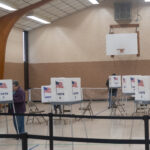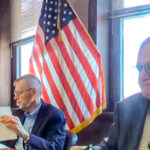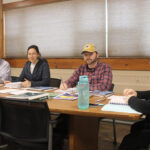The day was overcast but still warm for September. I was in shorts and a well-worn wool plaid shirt–one of my standbys from fishing trips past. Andy, my friend and local guide, was waiting anxiously beside his trailer when I pulled up.
“Forecast is calling for a bit of rain,” he said. We looked skyward, concluding the threat was low and we would go ahead. I proceeded to pack my fishing bag and rod in the canoe. We were off in minutes, over the dirt trail out of Wheaton’s and onto the main road, headed to Spudnick Lake for a day of bass fishing.
Our talk in the truck was on the three W’s: work and women– his and mine–and the weather. A few raindrops on the windshield were not going to stop us. On arrival, the routine was the same: backing the trailer down to the water and then dropping the canoe in with a small splash. Comfortable as always in the re-fashioned car seats, we took off for our favorite fall fishing spot.
An osprey passed overhead, circling high. This graceful hawk can occasionally be heard making a sharp cry when it flies close to the water; I have spotted its nesting platform when exploring further east, on the Canadian side of the lake.
Andy has a 15-horsepower motor on his canoe so the ride was the usual languid pace. I dropped my hand in the water to feel the gentle rush through my fingers as we cruised along. Despite the overcast skies and some heavy-looking clouds on the horizon, the sun was steadily breaking through. Any lingering concerns about the weather were displaced by the anticipation for a great fishing day and the overwhelming beauty of the wilderness we were passing through. Andy knows the lake well and could navigate it with his eyes closed.
We arrived at our destination and it was time to fish. My rod was ready, my trusty streamer tied. I start casting and bang got a hit. We did our customary, congratulatory high fives and for the next couple of hours caught and released the equivalent of a small school of bass. It was about that time Andy mentioned the weather was turning. I hadn’t looked up from the water for the last couple of hours. I removed my fishing glasses and sat down to observe the sky. It was cloudy and getting dark.
Andy was looking serious and not fishy-happy. “What’s happening?” I asked. He told me to stay seated and hold on. Well that little outboard motor had some push to it. We took off with the bow of the canoe tilting upward, moving full throttle through the water. The cold rain came down suddenly and in sheets, hitting me in the face like sleet. Andy was saying something but between the roar of the motor and the pounding rain I couldn’t make it out. We were soaked in a matter of seconds. My legs were quaking from the cold as I tried to shield my face in my bandanna.
After a few minutes that felt like an eternity, we were close to shore. Not the shore we set out from however. What now I thought? Andy hopped out into the shallows to pull the canoe–with me in it–to land. We were on an island. A remote, deeply forested and apparently uninhabited island. I got out and headed for the shelter of the trees at the edge of the shore. Andy pulled up the canoe and started unloading the lunch gear: fire starter, wood, food, utensils. He threw a rolled-up canvas toward me. “Put this on,” he said. I opened it and realized it was an old fisherman’s jumpsuit. Judging from the smell of it, it was still wet when it was rolled up and stored in Andy’s cellar. There was at least a decade’s worth of mildew on it and I couldn’t have been happier to put it on. It was an effective shield against the relentless rain.
Andy’s guide skills shine in these situations. He knew exactly where we were and ordered me to follow him. We gathered up the lunch gear and headed deeper into the woods. I trusted Andy but not my own eyes when I saw what was before me in the middle of a clearing: an old, small, abandoned cabin.
The cabin was built on large log posts and the entire exterior was covered in pine from the island. Incredibly, it seemed some recent carpentry work had been done to shore up the foundation. Andy headed over and waved me to the porch. The screenless screen door led to an interior carpeted with moss. It had clearly not been occupied for years. There were no furnishings or even a kitchen, just a great room lined with empty shelves and a floor-to-ceiling stone fireplace — though there was evidence of some recent four-legged visitors. There was one bedroom.
Andy ran back to secure his canoe and left me alone with instructions to start a fire in the stone hearth. There were some piles of sawdust and leftover kindling. Along with Andy’s firestarter soon a few small flames began to flicker and build, creating some warmth and light in the dank room. I shed my smelly jumpsuit, sneezed about a dozen times from the mildew, and then sat down cross-legged on the mossy floor in front of the fire to warm up.
Andy got back from tying up the canoe and brought the coffee pot back with lake water. “We may be here overnight,“ he said. My first concern was that we didn’t have provisions for dinner or sleeping bags. We could survive until the next day without food, I was much less enthusiastic spending the night on the cold, wet floor. I questioned whether we should ration our limited food supply. Andy shrugged. He is a man of few words. He doesn’t predict or assume. When the fish don’t take he says, “It must be something.”
The heavy rain continued. We were both hungry. So we threw caution to the wind and enjoyed our full, “stream-side” lunch prepared by the kitchen staff at Wheatons: grilled chicken, boiled potatoes and onions, blueberry pie and fresh coffee made with lake water. Afterward, we rested in quiet contemplation against a crusted, splintered wall of the cabin, as the rain beat steadily down on the tin roof. I prodded Andy to tell me what he knew about the history of the cabin. The man of few words opened up. Back in the day it was the vacation home of a former professor from the University of Maine. He had grown up in and around Forest City, left to go to college, and fell in love with a fellow student who became his wife. He went on to become a professor at the University and lived the academic life — teaching during the school year and summering at the cabin on the island.
Upon retirement, he and his wife spent more time at the cabin and extended their stay from first ice melt to first snowstorm. There was no electricity or running water, no bathroom–just an outhouse which had deteriorated and fallen over. The overgrown gardens reflected a past happier time. The professor lost his wife to cancer after 65 years and he retired permanently to the cabin. The empty shelves in the great room were once filled with his books. The professor, as he was known to the locals, became more reclusive as the years went on.
By the time he was in his 80s he seldom traveled to shore for supplies. He survived due to the good will of a young man he met by chance at the local General Store on shore on Route 1 near Forest City. The young fellow was a local and a student at the University Maine. He worked as a fishing guide at Wheaton’s Lodge and knew of the professor who had achieved something of a semi-legendary status among the locals. They struck up a friendship. Thereafter, every summer when the young man returned home he would visit the professor on the island with provisions.
Eventually the professor stopped coming over to the mainland and his only source of supplies was this young man, who made arrangements for regular deliveries during the fall and winter months. The professor lived into his 90’s alone but for the memories of his beloved wife, his books and the friendship of this young man, who went on to become a professor himself at the University of Maine in large part owing to the influence of his elderly friend.
When the professor died, about three years ago, he left his island and his books to the young man, who has slowly been restoring the cabin as a vacation place of his own. I gazed at the empty shelves and imagined them teeming with books, a blazing fire in the hearth, a fur rug and some well-worn overstuffed furniture. It would have been a real sanctuary, as it was for us that day.
Epilogue: the rain finally stopped and we made it back to the mainland before dark.
Lenny is a land use attorney who has practiced in East Hampton, New York for nearly 50 years. He spends spring and summer in Danforth, where he has a cabin on East Grand Lake.





